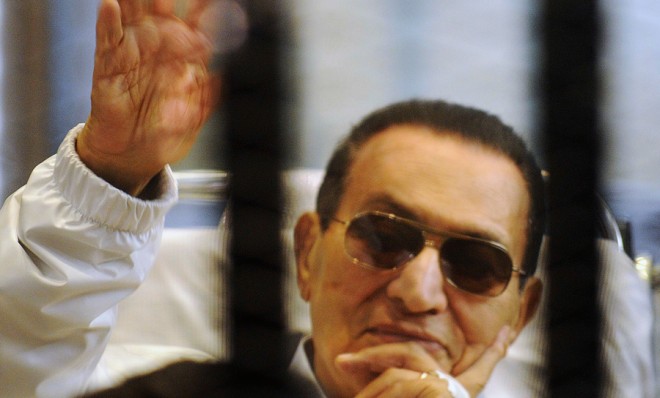The many risks of freeing Hosni Mubarak
As if things in Egypt weren't bad enough already...


A free daily email with the biggest news stories of the day – and the best features from TheWeek.com
You are now subscribed
Your newsletter sign-up was successful
With Egypt already ravaged by political chaos and violence, a court acquitted former leader Hosni Mubarak on corruption charges Monday. A lawyer for Mubarak, who was ousted in the 2011 Arab Spring rebellion, said the 85-year-old former president could be freed this week, although court officials said no final decision would be made for two weeks.
Mubarak still faces a retrial on charges that he was guilty of involvement in the killing of hundreds of protesters during the uprising against his rule, although he now could be freed on bail until that case is settled.
This news came as violence spread following last week's deadly crackdown on Islamists demanding the reinstatement of Mohamed Morsi, who was elected last year then forced from power by the military in July after critics accused him of trampling opposition rights and imposing Islamist policies. On Monday, suspected Islamist militants killed 24 police conscripts in the Sinai Peninsula, after authorities confirmed that 36 Muslim Brotherhood members had died in a thwarted prison break. Some 800 people have died in Egypt in the last week alone.
The Week
Escape your echo chamber. Get the facts behind the news, plus analysis from multiple perspectives.

Sign up for The Week's Free Newsletters
From our morning news briefing to a weekly Good News Newsletter, get the best of The Week delivered directly to your inbox.
From our morning news briefing to a weekly Good News Newsletter, get the best of The Week delivered directly to your inbox.
Freeing a man still reviled by many Egyptians as a ruthless dictator — while the duly elected Morsi remains in custody — would create problems for the interim government on several fronts. The most likely immediate consequence, suggests Jeffrey Fleishman in the Los Angeles Times, is that releasing Mubarak would "incite fresh unrest at a time the military-installed government is cracking down on the Muslim Brotherhood," which was outlawed under Mubarak.
Even the military's allies might be disgusted by the move. "Mubarak is about as popular as rat poison," says Rick Moran at The American Thinker. If Mubarak is allowed to go home, Moran says, the military will lose much of the support it has had from liberals in its showdown with the Islamists demanding Morsi's reinstatement.
The young, especially, will not like the idea of letting Mubarak off the hook. They drove the initial protests that topped him and were the most vocal about trying him for the 800 deaths that resulted from the Arab Spring protests.If the young turn from the government, that would only complicate the situation and might even generate some sympathy for the Muslim Brotherhood. [American Thinker]
The move might also force other countries to increase the pressure on Egypt's military to end its deadly crackdown on Morsi's supporters. European diplomats are already meeting in Brussels to consider using $6.7 billion in promised aid as leverage to force the army to make peace with the Brotherhood. Ed Morrissey at Hot Air says going easy on Mubarak would only increase the heat on the interim government and its backers in the military.
This will test both the patience of Egyptians and the diplomatic skills of the West. The U.S. and the West had a relatively close relationship with Mubarak for decades, thanks to his agreement to abide by the Camp David peace accords and our willingness to pay the military for that policy. However, the Egyptian people have had enough of Mubarak; even now, with Mohamed Morsi and the Muslim Brotherhood being widely reviled, there isn't any groundswell of nostalgia for Mubarak's dictatorship. [Hot Air]
For now, though, Mubarak's fate remains uncertain. David D. Kirkpatrick, Alan Cowell, and Rod Nordland note at The New York Times that Egyptian authorities could find ways to justify keeping Mubarak in custody no matter how his current legal case is resolved. Ultimately, the Times reporters say, "The outcome of their deliberations is likely to be read as a pivotal test of the new government installed by General Abdul-Fattah el-Sisi and its desire to replicate or repudiate Mr. Mubarak's rule."
A free daily email with the biggest news stories of the day – and the best features from TheWeek.com
Harold Maass is a contributing editor at The Week. He has been writing for The Week since the 2001 debut of the U.S. print edition and served as editor of TheWeek.com when it launched in 2008. Harold started his career as a newspaper reporter in South Florida and Haiti. He has previously worked for a variety of news outlets, including The Miami Herald, ABC News and Fox News, and for several years wrote a daily roundup of financial news for The Week and Yahoo Finance.
-
 The environmental cost of GLP-1s
The environmental cost of GLP-1sThe explainer Producing the drugs is a dirty process
-
 Greenland’s capital becomes ground zero for the country’s diplomatic straits
Greenland’s capital becomes ground zero for the country’s diplomatic straitsIN THE SPOTLIGHT A flurry of new consular activity in Nuuk shows how important Greenland has become to Europeans’ anxiety about American imperialism
-
 ‘This is something that happens all too often’
‘This is something that happens all too often’Instant Opinion Opinion, comment and editorials of the day
